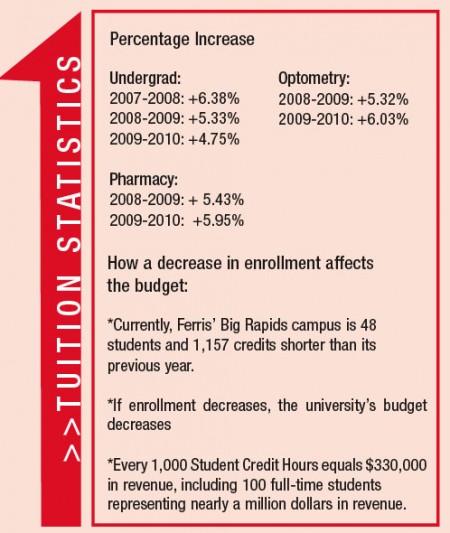
As Michigan’s budget continues to be reduced in various areas, tuition will be increasing for the 2010-2011 academic year at Ferris.
The Ferris Board of Trustees held a meeting July 14 to approve the decision for the increase. The added costs of compensation for Ferris employees, unfunded mandates from the state or federal governments, utilities and financial aid are some of the prime factors for the increase.
President Eisler said the university increases tuition to cover a portion of these annual costs as state funding decreases.
“What we do not do is raise tuition to cover reductions in state funding,” Eisler said. “When the state cuts our budget, we reduce our budget and do not ask students to cover these costs.”
However, with enrollment down for the fall 2010 semester, the budget may have to be reduced “even further beyond the reductions received from the state,” said Eisler in his Aug. 10 memorandum to faculty and staff.
“Anything that discourages students from enrolling or attending in the fall will have significant budget repercussions,” said Eisler.
According to a July 14 press release from University News Services, undergraduate tuition will increase by 4.75 percent. This is an increase from $316 per credit hour to $331 per credit hour. The rates will also increase to $4,965 per semester and to $9,930 annually, based on 15 credits per semester.
Tuition rates for graduate students will also rise from $425 per credit hour to $450 per credit hour. Students who are taking credits from the university’s first professional programs will see an increase to $545 per credit hour for Optometry and $534 per credit hour for Pharmacy. Residence hall and dining room rates have also increased from $8,340 to $8,580 for a standard occupancy room.
However, the increases will also expend more by increasing financial aid for students by 10 percent per year. Ferris board members approved a one-time $500,000 incentive to assist families impacted by current economic conditions.
In addition, administrators have also decided to offer the new Ferris Achievement Scholarship; an extension of the current Woodbridge N. Ferris Scholarship. The scholarship ranges from $1,000-$4,000 based on a student’s criteria.
Jerry Scoby, Vice President of Finance and Administration, said housing is down about 21 students, which is also a factor in increased rates. Other contributing factors include the economy, pricing of room and board and a decreased demand in on-campus housing.
“Ferris is not a place that tacks on fee after fee,” said Eisler. He said Ferris will place its fees within the budget they proposed to for the upcoming academic year.
As the tuition increase leads to increases in other areas, students understand why tuition rates are rising.
“It’s not surprising,” said Brian Stohl, a junior in automotive engineering technology.
Stohl is an out-of-state student and has a higher tuition rate than in-state students. Stohl added that tuition rises every year due to the weak economy, but he is not worried about being able to pay for school. Joshua Scott, a sophomore in pre-pharmacy, agrees with Stohl.
“I understand why they’re doing it, they need a certain amount of money to run the school and they have to get it from somewhere,” said Scott
Scott also agrees that times are tough economically for everyone, including college students.
“That’s going to make it harder to avoid costly long-term student loans,”
said Scott. n
